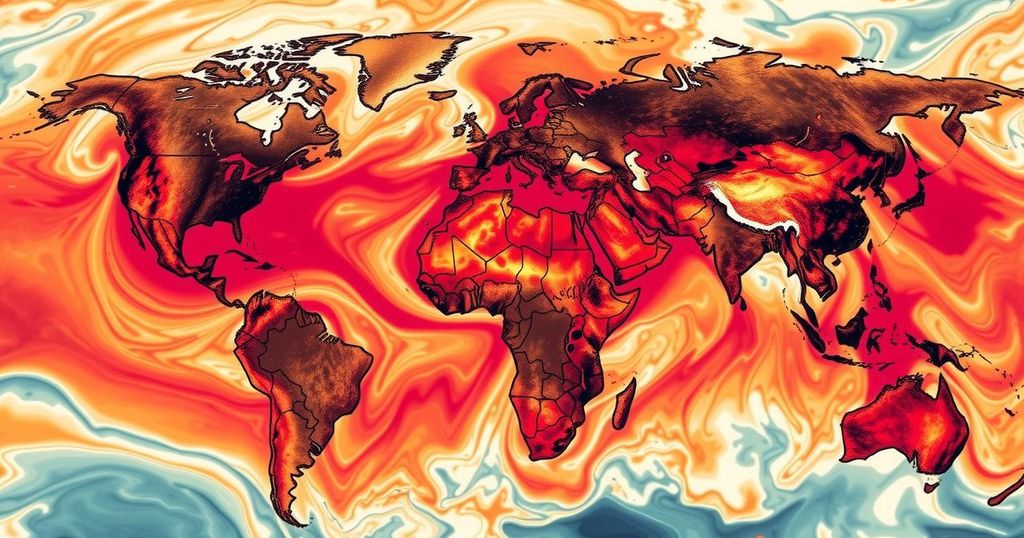The year 2024 was the hottest on record with global temperatures 1.6 degrees Celsius above preindustrial levels, attributed to greenhouse gas emissions exacerbated by the El Niño phenomenon. The extreme heat resulted in significant loss of life and widespread environmental damage, particularly affecting vulnerable communities. Global climate diplomacy faced challenges as wealthier nations failed to provide adequate support to those hit hardest by climate impacts.
In 2024, the world experienced unprecedented heat, making it the hottest year on record. Data from the European Union’s Copernicus Climate Change Service indicated that global temperatures soared to 1.6 degrees Celsius above preindustrial levels, marking the second consecutive year of record warmth. The majority of continents, with the exceptions of Australia and Antarctica, along with significant ocean regions, reported their hottest temperatures. Experts attribute this trend to increasing greenhouse gas emissions resulting from fossil fuel consumption. “As long as people keep burning fossil fuels, this will only get worse,” stated Friederike Otto from the World Weather Attribution group.
The El Niño phenomenon, which began in 2023, significantly contributed to rising temperatures by increasing global warming levels faster than anticipated. The impact of these rising temperatures was apparent across the globe with devastating heat-related events. Heatwaves claimed around 1,300 lives in Saudi Arabia while wildfires wreaked havoc in South America, and howler monkeys succumbed to the extreme heat in Mexico. The oceans were not spared either, experiencing significant marine heat waves that intensified storms and flooding, particularly noteworthy in regions like Dubai and Spain.
The occurrence of simultaneous tropical cyclones in the western Pacific displaced hundreds of thousands of individuals, exemplifying the vast effects of extreme weather events. Notable flooding incidents, especially in regions such as Spain and Nigeria, highlighted the increasing vulnerability to climate disasters faced by less developed nations. Amidst these events, international climate diplomacy struggled, with wealthier nations failing to provide adequate financial support to developing countries grappling with climate change effects. Undoubtedly, the toll on the environment continued to rise amid this escalating crisis.
While projections suggest a possible decrease in temperatures for 2025, the general trend remains concerning, as the planet has already surpassed the 1.5-degree Celsius threshold, which complicates efforts related to the Paris Agreement. The recent climate challenges underscore the pressing need for a transformational approach to mitigate greenhouse gas emissions and adapt to the unfolding climate crises.
The article addresses the severe impacts of climate change observed in recent years, particularly focusing on the year 2024, which was recorded as the hottest year globally. The discussion includes expert opinions on the effects of fossil fuel consumption, the influence of natural phenomena such as El Niño, and the role of greenhouse gases in exacerbating extreme weather conditions. It highlights the consequences faced by various regions worldwide, illustrating the complex interplay of climate change, human activity, and environmental disaster.
In summary, 2024 marked a grim milestone in the ongoing climate crisis, revealing record-breaking temperatures and accompanying extreme weather events that significantly impacted human lives and the environment. The events underscore the urgent need for a global commitment to reducing fossil fuel dependency and enhancing climate resilience, especially for the most vulnerable regions. Without decisive action, the trajectory of rising temperatures and associated calamities is likely to persist, posing profound challenges for future generations.
Original Source: www.washingtonpost.com






